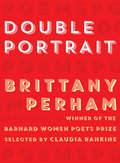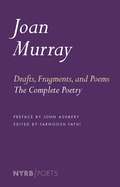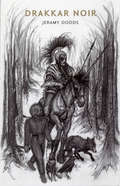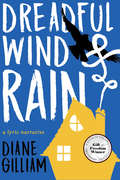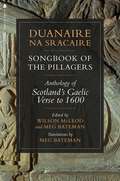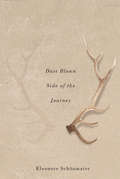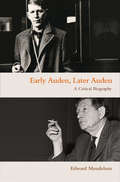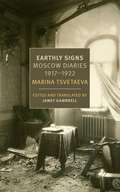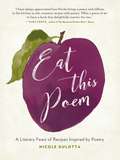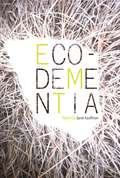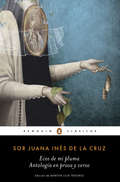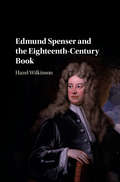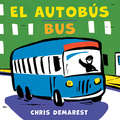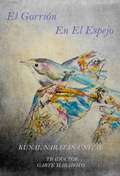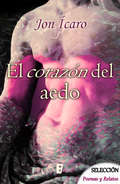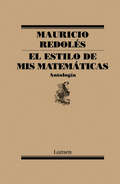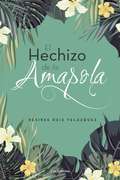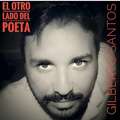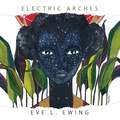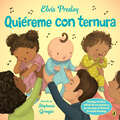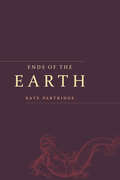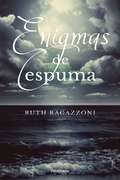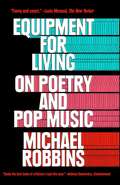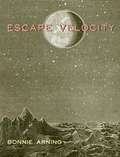- Table View
- List View
Double Portrait
by Brittany Perham“Musical, insightful, and all the way human.”—Claudia Rankine, 2016 Barnard Women Poets Prize citation Each poem in Brittany Perham’s prize-winning collection links two portraits: lover and beloved, child and parent, citizen and country, spirit and body, living and dead. Each speaker investigates what it means to be in relationship to another: what does it mean to see and be seen, to reflect and be reflected, to address and be addressed? With musicality, grit, and humor, these poems challenge our conceptions of identity and language. By questioning the ways we think and speak, the ways we rehash and reshape our experience, they formalize obsession. Emotionally stirring and unapologetic, Double Portrait contemplates the nature of devotion.
Drafts, Fragments, and Poems: The Complete Poetry
by John Ashbery Joan Murray Farnoosh FathiThe first appearance of this award-winning writer's work since the 1940s, this collection, which includes an introduction by John Ashbery, restores Joan Murray's striking poetry to its originally intended form.Though John Ashbery hailed Joan Murray as a key influence on his work, Murray’s sole collection, Poems, published after her death at the early age of twenty-four and selected by W. H. Auden for inclusion in the Yale Series of Younger Poets, has been almost entirely unavailable for the better part of half a century. Poems was put together by Grant Code, a close friend of Murray’s mother, and when Murray’s papers, long thought to be lost, reappeared in 2013, it became clear that Code had exercised a heavy editorial hand. This new collection, edited by Farnoosh Fathi from Murray’s original manuscripts, restores Murray’s raw lyricism and visionary lines, while also including a good deal of previously unpublished work, as well as a selection of her exuberant letters.
Drakkar Noir
by Jeramy Dodds Jeramy DoddsFollowing the Fratellini Family of clowns, Jeramy Dodds astonishes readers and non-readers alike. Techniques such as his patented triumph, the Grand Mal Caesura, along with other favourites, are on display inside. Dodds is a warlock of words, only to be outdone by them, enslaved by them, freed by them – maybe even loved by them. A haunting, yet hilarious depiction of a journey to and from the furthest limits of the human experiment.
Dreadful Wind & Rain: A Lyric Narrative
by Diane GilliamFrom the award-winning author of Kettle Bottom, a sequence of fairytale-inspired narrative poems concerning the life of a troubled girl.Once upon a time, there lived a girl whose story was not her own . . . So the story goes: Neglected and abused by her family, eclipsed by her elder and more beautiful sister, a young girl longs for happily-ever-after, for something, someone to rescue her. She is soon swept away into the next chapter of her life: marriage—a promising world mirroring Old Testament stories and fairy tale traditions. But loving just anyone and living the age-old &“ever-after&” narrative, as it turns out, fails to bring true happiness after all. Dragged down by a destructive marriage, her sister&’s continued manipulations, and the growing weight of roles and expectations created by others at her back, she must choose between continuing in her familiar, complacent life, or boldly breaking free—and finally making her own way. Named for an Appalachian murder ballad in which a girl is drowned by her sister, this lyrical fairy tale unseats expectations for what it means to live a fairy tale life, revealing the powerful force that comes from stripping away the traditional roles and beginning to write a story all your own.Praise for Dreadful Wind & Rain &“Ache and lift and veracity tambourine through these lines and stanzas. This . . . collection exults its power inside our ears and through our hearts in a rich, stinging, marvelous way . . . I believe that Diane Gilliam is incorruptible as a poet.&” —Nikky Finney, poet, winner of the National Book Award for Head Off & Split
Duanaire Na Sracaire: Anthology of Medieval Gaelic Poetry
by Wilson McLeod and Meg BatemanThe definitive Gaelic-English anthology of medieval Scottish verse: an annotated treasure trove of literary history spanning a millennium. Duanaire na Sracaire—or Songbook of the Pillagers—is the first anthology to bring together Scotland&’s Gaelic poetry from c.600-1600 AD, a time when Scotland shared its rich culture with Ireland. It includes a huge range of diverse poetry: prayers and hymns of Iona, Fenian lays, praise poems and satires, courtly songs and lewd rants, songs of battle and death, incantations and love poems. All poems appear with facing-page translations which capture the spirit and beauty of the originals and are accompanied by detailed notes. A comprehensive introduction sets the context and analyses the role and functions of poetry in Gaelic society. This collection will appeal to poetry lovers, Gaelic speakers and those keen to explore a vital part of Scotland&’s literary heritage.
Dust Blown Side of the Journey
by Eleonore SchönmaierAt times apocalyptic and other times passionate and intimate, Eleonore Schönmaier’s poems show the beauty of the lived and natural world in both wilderness and urban settings. A woman hides her love letters in beehives, a cherry tree in full blossom is transported horizontally on a bike, and three crows tap their beaks on a metal door. A grandmother gestures how birds once flew in blue skies, public smiles are outlawed, and a shot-down jet lands in a field of wildflowers. Men from warm countries wear big coats and are falsely suspected of hiding bombs, an Indigenous man is forced by police into the trunk of a car, and a stork lands in prison under charges of espionage. In Canada, the northern village of Paradise is under evacuation orders, and in Europe Desmond Tutu steps down from a podium into a crowd of photographers. Over a Belgian lunch Frederic Rzewski talks about his piano concerto A Dog’s Life, and a Dutch dinner is shared with a young refugee boy who laughs joyously. Reflecting a childhood in the northern Canadian boreal forest, combined with an adult life lived without borders, Eleonore Schönmaier’s vivid and sensual language invites the reader to fully join in and enjoy the journey.
Dust Blown Side of the Journey (Hugh MacLennan Poetry Series)
by Eleonore SchönmaierAt times apocalyptic and other times passionate and intimate, Eleonore Schönmaier’s poems show the beauty of the lived and natural world in both wilderness and urban settings. A woman hides her love letters in beehives, a cherry tree in full blossom is transported horizontally on a bike, and three crows tap their beaks on a metal door. A grandmother gestures how birds once flew in blue skies, public smiles are outlawed, and a shot-down jet lands in a field of wildflowers. Men from warm countries wear big coats and are falsely suspected of hiding bombs, an Indigenous man is forced by police into the trunk of a car, and a stork lands in prison under charges of espionage. In Canada, the northern village of Paradise is under evacuation orders, and in Europe Desmond Tutu steps down from a podium into a crowd of photographers. Over a Belgian lunch Frederic Rzewski talks about his piano concerto A Dog’s Life, and a Dutch dinner is shared with a young refugee boy who laughs joyously. Reflecting a childhood in the northern Canadian boreal forest, combined with an adult life lived without borders, Eleonore Schönmaier’s vivid and sensual language invites the reader to fully join in and enjoy the journey.
Early Auden, Later Auden: A Critical Biography
by Edward MendelsonPresented in one volume for the very first time, and updated with new archival discoveries, Early Auden, Later Auden reintroduces Edward Mendelson's acclaimed, two-part biography of W. H. Auden (1907–73), one of the greatest literary figures of the twentieth century. This book offers a detailed history and interpretation of Auden’s oeuvre, spanning the duration of his career from juvenilia to his final works in poetry as well as theatre, film, radio, opera, essays, and lectures. Early Auden, Later Auden follows the evolution of the poet’s thought, offering a comparison of Auden’s views at various junctures over a lifetime. With penetrating insight, Mendelson examines Auden’s early ideas, methods, and personal transitions as reflected in poems, manuscripts, and private papers. The book then links changes in Auden’s intellectual, emotional, and religious experience with his shifting public role—showing the depth of his personal struggles with self and with fame, and the means by which these internal conflicts were reflected in his art in later years. Featuring a new preface by the author, Early Auden, Later Auden is an engaging and timeless work that demonstrates Auden’s remarkable range and complexity, paying homage to his enduring legacy.
Earthly Signs: Moscow Diaries, 1917-1922
by Jamey Gambrell Marina TsvetaevaA moving collection of autobiographical essays from a Russian poet and refugee of the Bolshevik Revolution.Marina Tsvetaeva ranks with Anna Akhmatova, Osip Mandelstam, and Boris Pasternak as one of Russia’s greatest twentieth-century poets. Her suicide at the age of forty-eight was the tragic culmination of a life buffeted by political upheaval. The essays collected in this volume are based on diaries she kept during the turbulent years of the Revolution and Civil War. In them she records conversations of women in the markets, soldiers and peasants on the train traveling from the Crimea to Moscow in October 1917, fighting in the streets of Moscow, a frantic scramble with co-workers to dig frozen potatoes out of a cellar, and poetry readings organized by a newly minted Soviet bohemia. Alone in Moscow with two small children, no income, and a missing husband, Tsvetaeva struggled to feed her daughters (one of whom died of malnutrition in an orphanage), find employment in the Soviet bureaucracy, and keep writing poetry. Her keen and ruthless eye observes with compassion and humor—bringing the social, economic, and cultural chaos of the period to life. These autobiographical writings not only give a vivid eyewitness account of Russian history but provide vital insights into the workings of Tsvetaeva’s unique poetics.Includes black and white photographs.
Eat This Poem: A Literary Feast of Recipes Inspired by Poetry
by Nicole GulottaA literary cookbook that celebrates food and poetry, two of life's essential ingredients.In the same way that salt seasons ingredients to bring out their flavors, poetry seasons our lives; when celebrated together, our everyday moments and meals are richer and more meaningful. The twenty-five inspiring poems in this book—from such poets as Marge Piercy, Louise Glück, Mark Strand, Mary Oliver, Billy Collins, Jane Hirshfield—are accompanied by seventy-five recipes that bring the richness of words to life in our kitchen, on our plate, and through our palate. Eat This Poem opens us up to fresh ways of accessing poetry and lends new meaning to the foods we cook.
Eco-dementia
by Janet KauffmanJanet Kauffman describes “eco-dementia” as a paradoxical condition of humanity—a love of the living world while simultaneously causing and suffering from its destruction. Like other dementias, losses are profound. We lose touch, we forget. We don’t recognize our own home—the habitat that sustains us. What has driven us to exploit more and more resources, even when risking self-annihilation? Eco-dementia is not nature poetry, but an immersive language in the tangle of the living world that begs the question: can we survive this relationship? The poems in Eco-dementia took shape in one decade of the author’s life. In three sections, Kauffman reflects on insanities and devastations, from the personal to the global. From her father’s Alzheimer’s and the ravaged world of his mind to the horrors of Abu Ghraib, Hurricane Katrina, and toxins in Lake Erie, as well as the planetary-wide ecological catastrophe of climate change. Yet despite this devastation, it is possible to surround ourselves in light and air, to touch the tall grasses we love, to step into water and shade and feel an intense, momentary joy. Kauffman’s poems show the bliss within the elemental richness of the natural world and also the violent distortions and grief at its devastation. Like learning a new language, we can see and hear words, sometimes understanding so clearly and other times not at all. Or as Kauffman’s father puts it, “I know where you live, but I don’t know who you are.” The language of these poems is the physical material of a damaged world. Readers of modern and experimental poetry will treasure this collection.
Ecos de mi pluma: Antología en prosa y verso
by Sor Juana de la Cruz«Pero valor, corazón: porque en tan dulce tormento, en medio de cualquier suerte no dejar de amar protesto» Sor Juana Inés de la Cruz es una de las poetas más importantes de la lengua española. Cierra con broche de oro el Barroco hispánico y es, además, una figura muy seductora: mujer, monja, sabia, defensora de la capacidad intelectual de las mujeres. Sin embargo, como todo autor célebre, sor Juana ha sido víctima de su fama: todo mundo la conoce, pero muy pocos la leen. Esta antología presenta una selección representativa de su obra, cuidadosamente puntuada y anotada, para acercarla a cualquier tipo de lector. Como novedad se incluyen, por primera vez juntas, la Carta de sor Juana a su confesor, el padre Núñez, y la Respuesta a sor Filotea de la Cruz, dirigida al obispo de Puebla, atinadamente comentadas por la editora: Martha Lilia Tenorio, especialista en poesía barroca, dedicada a recuperar buena parte del acervo lírico de Nueva España. Edición, prólogo, notas y cronología de MARTHA LILIA TENORIO.
Edmund Spenser and the Eighteenth-Century Book
by Hazel WilkinsonEdmund Spenser's epic poem The Faerie Queene (1590-96) occupied an important place in eighteenth-century culture. Spenser influenced almost every major writer of the century, from Alexander Pope to William Wordsworth. What was it like to read Spenser in the eighteenth century? Who made Spenserian books, and how did their owners use and interpret them? The first comprehensive study of all of the eighteenth-century editions of Edmund Spenser addresses these questions through bibliographical analysis, and through examination of the history of the book and of eighteenth-century literature and culture. Within these contexts, Hazel Wilkinson provides new information about the production, contents, texts, and reception of the eighteenth-century editions of Spenser, to illuminate how his cultural presence became so far-reaching. With each chapter structured around a major edition of Spenser's work, this volume provides a timely addition to arguments about the nature of literary history and the growing cult of great writers of the past.
El Autobús/Bus
by Chris Demarest Carlos CalvoBus rolls. Busy street. First stop, people meet. El autobús avanza. La calle está llena. En la primera parada, la gente espera. The big, colorful, noisy city comes to life in this deceptively simple rhyming book. Little listeners will be mesmerized by the rhythmic, rhyming ride—perfect reading for kids on a roll!
El Gorrión En El Espejo
by CAPT KUNAL NARAYAN UNIYAL Garye Maraboto RouxDesde el primer acto de desobediencia, el hombre ha estado en una lucha constante contra su mayor adversario: EL EGO. Mientras más le entrega el hombre al ego, más se aleja de su ser divino. Su motivación materialista, su búsqueda de poder y su desagradable indiferencia lo aísla y lo distancia de este ser. Esclavizado por su ego el hombre se deleita con falso orgullo, falsa gloria y aún más falsa seguridad. La búsqueda nunca termina. La sed nunca es saciada. La mente permanece preocupada. El corazón hierve, perturbado. La razón fría oculta la sabiduría y la necesidad humana de justificación. Aun así, el Señor tiene un plan mayor. A todos se nos ha entregado su reino, está dentro de nosotros. En el momento en el que iniciamos nuestro viaje hacia adentro la neblina comienza a disiparse. La sabiduría infinita surge. El ruido cesa y la calma llega. Alegría verdadera sale del corazón y nos conduce a la paz, la harmonía y al equilibrio. Lo único que se necesita es detenerse y mirar al interior.
El corazón de aedo
by Jon ÍcaroEl corazón del aedo es una colección de poemas y relatos cortos de amor que abarca la historia de la humanidad hasta, aproximadamente, el siglo II a. C. Dos amantes egipcios separados por las diferencias entre el Alto y Bajo Egipto. Un guardián del harén de Ramsés II enamorado de una de las mujeres del faraón. Un viril guerrero espartano cuya fuerza no es suficiente para enamorar a una refinada aristócrata ateniense. Un fiero y bestial asirio que solo encuentra calma en la dulzura de su amada. Un gobernante de Zhou incapaz de controlar sus pasiones siguiendo los consejos de Confucio... El verso posee una belleza que se escapa a la prosa, pero a veces se queda escaso para la épica de un relato amoroso.
El estilo de mis matemáticas
by Mauricio RedolesLa poesía única y las mejores canciones de Mauricio Redolés, legendario ícono de la cultura chilena Con sus canciones, poemas y apariciones públicas, Mauricio Redolés se ha convertido en una figura incomparable de la cultura chilena. Atrevido, perspicaz, lírico, delicado y humorístico son términos con los que su trabajo podría ser descrito. Pero quedan cortos. Redolés es imprevisible, va por la libre. Pasa como si nada del poema coloquial al tango audaz, de la elegía amorosa al canto paródico, del chiste político al verso filosófico. El año 2000, bajo el título Estar de la poesía o el estilo de mis matemáticas, el propio autor editó un volumen con sus mejores poemas que se convirtió en un verdadero best seller alternativo. La presente edición es una remasterización de ese libro mítico prologada por el poeta y filósofo Yanko González.
El hechizo de la amapola
by Desiree Ruiz VelázquezNo me importó desbocarme ante tal desenfreno. Resonó tu advertencia, haciéndose insignificante en mi cabeza. <P><P>«No juegues con fuego», parecía cada vez más tentador. Pero yo solo quería una cosa: jugar sin importarme las quemaduras por venir. El Hechizo de la Amapola ha logrado traducir algunas experiencias; enamoramientos y desvelos disfrazados de poemas sublimes en los cuales muchos podrían ver reflejadas sus propias historias. <P>A través de relatos, textos y poemas, el libro narra un «era una vez» construido con realidades como también de momentos ficticios, inspirados en un «ojalá». Es un viaje de descubrimientos personales provocados por un amor, de esos que sacuden y revuelcan tu mundo.
El otro lado del poeta
by Gilberto Santos Prof.Me.Gilmar da Silva PaivaEste es un libro de poesías que camina por diversas vías de entre ella la que más me impresionó fue la vía espiritual en que el autor descontent con la falta de amor en la tierra y sabiendo que este amor parte de ambos enamorados sufre más pronto después de regocijarse on la paz y en otros va más erotizado a romper con este sentimiento que une amante para solamente disfrutar de las carencias de su amada y un libro vasto de asuntos liricos que a veces la maoíria aparece con un verso libre donde el autor pudo disfrutar de más Libertad en su poesía y expresar sus sentimientos y sus percepciones del mundo.
Electric Arches
by Eve L. EwingElectric Arches is an imaginative exploration of Black girlhood and womanhood through poetry, visual art, and narrative prose. <p><p> Blending stark realism with the surreal and fantastic, Eve L. Ewing's narrative takes us from the streets of 1990s Chicago to an unspecified future, deftly navigating the boundaries of space, time, and reality. Ewing imagines familiar figures in magical circumstances--blues legend Koko Taylor is a tall-tale hero; LeBron James travels through time and encounters his teenage self. She identifies everyday objects--hair moisturizer, a spiral notebook--as precious icons. <p> Her visual art is spare, playful, and poignant--a cereal box decoder ring that allows the wearer to understand what Black girls are saying; a teacher's angry, subversive message scrawled on the chalkboard. Electric Arches invites fresh conversations about race, gender, the city, identity, and the joy and pain of growing up.
Elvis Presley's Quiéreme con ternura
by Elvis PresleyQuiéreme con ternura. Quiéreme con dulzura. Nunca me dejes ir. Has llenado mi vida. Te quiero mucho, mi amor. Tomando como punto de partida la letra oficial de la conocida canción de Elvis Presley, este precioso y tierno álbum ilustrado es una oda al lazo de amor que existe entre padres e hijos.
Ends of the Earth: Poems (The Alaska Literary Series)
by Kate PartridgeEnds of the Earth uses the landscape of Alaska as a testing ground for love and elegy. It is a poetry collection that contains both lyric responses to the urban Alaska environment and extended sequences that cycle between autobiography, mythic allusion, and the literary archive. In her work, Kate Partridge combines the fresh perspective of a newcomer with explorations of the landscape and lifestyles through allusions to classic literature. While the poems turn an inquisitive, contemporary lens to the subject of Alaska, elements throughout the book are influenced by twentieth-century writers like Elizabeth Bishop and Marianne Moore. The manuscript also combines personal experience with collaged material from the Epic of Gilgamesh, Walt Whitman's notebooks, and other classic sources, to investigate the ideas of love, isolation, and location. Through humor and observation, Partridge takes a new look at what it means to live in urban Alaska and the world at large.
Enigmas de espuma
by Ruth RagazzoniPoemas vitales y relatos cortos sobre el alma, el amor y la espera. <P><P>Cuando se sumerja en los enigmas navegará a través de poemas que hablan de las miradas que jamás pudimos olvidar, de lo que supone la inspiración para aquellos que la inspiramos, de los largos paseos por los parques de nuestra niñez, del primer amor y su sedosa sensación, del que quisimos salvar mientras no nos dábamos cuenta que nos hundíamos más y más... o de aquel amor que nos dejó para viajar más allá de las estrellas, aquellas que cuando admiramos tintinean a través de nuestras distraídas lágrimas. <P><P>También conocerá a personajes a través de relatos cortos con los que podrá identificarse. En su periplo por el mismo quizás se reencuentre con momentos que le evoquen aquella mirada que jamás pudo olvidar o aquel beso del que no quiso desprenderse.
Equipment for Living: On Poetry and Pop Music
by Michael RobbinsBrilliant, illuminating criticism from a superstar poet—a refreshing, insightful look at how works of art, specifically poetry and popular music, can serve as essential tools for living.How can art help us make sense—or nonsense—of the world? If wrong life cannot be lived rightly, as Theodor Adorno had it, what weapons and strategies for living wrongly can art provide? With the same intelligence that animates his poetry, Michael Robbins addresses this weighty question while contemplating the idea of how strange it is that we need art at all. Ranging from Prince to Def Leppard, Lucille Clifton to Frederick Seidel, Robbins’s mastery of poetry and popular music shines in Equipment for Living. He has a singular ability to illustrate points with seemingly disparate examples (Friedrich Kittler and Taylor Swift, to W.B. Yeats and Anna Kendrick’s “Cups”). Robbins weaves a discussion on poet Juliana Spahr with the different subsets of Scandinavian black metal, illuminating subjects in ways that few scholars can achieve. Equipment for Living is also a wonderful guide to essential poetry and popular music.
Escape Velocity: Poems (Mountain West Poetry Series)
by Bonnie ArningFrom the moment of a marriage’s heated inception to its period of luminous crowding and onward into distance and darkness, Bonnie Arning’s Escape Velocity asks if it’s possible to exist outside the only universe we’ve ever known. In modes both lyric and narrative, we are given a peephole into the height and decline of a marriage that begins beneath the moving lights of Las Vegas, Nevada, and traverses the devastating terrain of gambling, miscarriage, infidelity, and violence. Arning gives voice to divergent aspects of love and violence through her use of math problems, erasures, dictionary entries, structured stanzas, and sprawling free verse. This multiplicity of forms comes together to explore everything from pop culture references of domestic violence to cultural notions of victims and victimhood. However dark, collectively these poems tell a love story—an acceptance of our capability to love those who hurt us, but also the love-of-self required to slowly and steadily reach "the velocity to be everleaving." In the tradition of Eavan Boland and Louise Glück, Arning wrestles down and examines the terrible without flinching. We journey with her, engrossed by each difficult truth: a precipice near which we are both terrified to stand and transfixed by its unnerving insistence on beauty.
